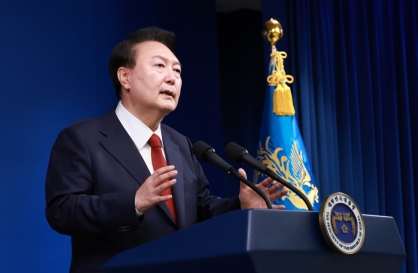Increase household income, former BOK governor says
By Korea HeraldPublished : Sept. 2, 2016 - 18:08
In Korea’s export-oriented economic model, domestic households have been largely neglected.
In order to support large corporations to sell more cars, ships and TVs to global consumers and earn more precious dollars, consumers at home were reduced to a mere source of labor. Using low wages and high savings to channel ample funds into the corporate sector was seen beneficial for the economy.

This, according to former Bank of Korea Governor Park Seung, is the root cause of many of Korea’s current economic problems.
In his diagnosis, presented to incumbent BOK officials at a lecture Friday, Korea is paying the price of its long negligence of domestic consumption, as its once-powerful engine of economic growth -- exports -- loses steam in the face of the global downturn and the formidable rise of Chinese manufacturers.
“Right now, the only way for Korea to continue growing its economy is through increased domestic consumption,” said Park, who headed the central bank from 2002-2006.
The latest public uproar over the country’s electricity pricing system which he said charges “unfairly” higher rates on households than corporations shows just how slow Korea is to move to the new era where households are the main driving force of the economy.
“It is a relic of the past industrial model, which doesn’t work anymore.”
For households to increase consumption, their income has to go up, Park said, suggesting that income redistribution and welfare expansion should be the keywords for Korea’s future economic policies.
“Korea should consider measures to boost consumer spending like Japan’s shopping vouchers and alleviate income disparity. In the past, the mantra was ’grow first and share later,‘ but now we must consider economic growth and wealth distribution at the same time,” he said.
He advised the government to expand welfare spending drastically, which is at the very bottom of all of the Organization for Economic Cooperation and Development member countries.
“Going forward, the biggest challenges to Korea’s economic growth will be low birthrates and the aging population,” he said.
By Lee Sun-young (milaya@heraldcorp.com)
In order to support large corporations to sell more cars, ships and TVs to global consumers and earn more precious dollars, consumers at home were reduced to a mere source of labor. Using low wages and high savings to channel ample funds into the corporate sector was seen beneficial for the economy.

This, according to former Bank of Korea Governor Park Seung, is the root cause of many of Korea’s current economic problems.
In his diagnosis, presented to incumbent BOK officials at a lecture Friday, Korea is paying the price of its long negligence of domestic consumption, as its once-powerful engine of economic growth -- exports -- loses steam in the face of the global downturn and the formidable rise of Chinese manufacturers.
“Right now, the only way for Korea to continue growing its economy is through increased domestic consumption,” said Park, who headed the central bank from 2002-2006.
The latest public uproar over the country’s electricity pricing system which he said charges “unfairly” higher rates on households than corporations shows just how slow Korea is to move to the new era where households are the main driving force of the economy.
“It is a relic of the past industrial model, which doesn’t work anymore.”
For households to increase consumption, their income has to go up, Park said, suggesting that income redistribution and welfare expansion should be the keywords for Korea’s future economic policies.
“Korea should consider measures to boost consumer spending like Japan’s shopping vouchers and alleviate income disparity. In the past, the mantra was ’grow first and share later,‘ but now we must consider economic growth and wealth distribution at the same time,” he said.
He advised the government to expand welfare spending drastically, which is at the very bottom of all of the Organization for Economic Cooperation and Development member countries.
“Going forward, the biggest challenges to Korea’s economic growth will be low birthrates and the aging population,” he said.
By Lee Sun-young (milaya@heraldcorp.com)
-
Articles by Korea Herald










![[K-pop’s dilemma] Time, profit pressures work against originality](http://res.heraldm.com/phpwas/restmb_idxmake.php?idx=644&simg=/content/image/2024/05/08/20240508050705_0.jpg&u=20240508171126)








![[Today’s K-pop] Stray Kids to drop new album in July: report](http://res.heraldm.com/phpwas/restmb_idxmake.php?idx=642&simg=/content/image/2024/05/09/20240509050659_0.jpg&u=)